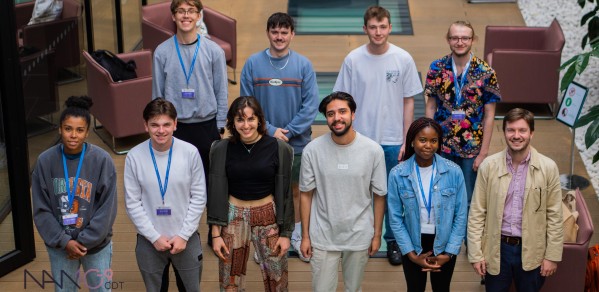
The UKRI CDT in Nanoscience and Nanotechnology (NanoDTC) ran a postgraduate widening participation internship programme, called 'NanoFutures Scholars', pioneering new approaches to postgraduate widening participation by exposing students with only limited prior research experience to cutting-edge interdisciplinary research.
Prior to my internship, I didn't really know what exactly postgraduate study entailed—it seemed to be something which was intangible, complex and inaccessible. My time in Cambridge taught me a lot about the day-to-day life and routine of a PhD student, which helped to demystify postgrad study and helped me to understand that it was right for me.
NanoFutures Scholar reflecting on their experiences of summer 2022
The UKRI CDT in Nanoscience and Nanotechnology (NanoDTC) was established in 2009 and is a world leader in postgraduate research and education for accelerating the discovery cycle of functional nanotechnologies and materials. Based across the Departments of Engineering, Physics, Chemistry, and Materials Science and Metallurgy, the group bridges ground-breaking fundamental science toward industrial device integration, and drives technological innovation via a strongly interdisciplinary approach. With many industry interactions, and a number of spin-outs the group have evidenced success in traction for novel nanomaterials and devices.
In the summer of 2022, the NanoDTC welcomed its first cohort of NanoFutures Scholars, undergraduate students that the NanoDTC identified as the future of nanoscience and nanotechnology research. Two of the scholars are at the Institute for Manufacturing, part of the Department of Engineering. Through the NanoFutures Scholars internship programme, one of the first of its kind in the University, the NanoDTC is leading the Physical Sciences and Engineering at Cambridge in pioneering new approaches to postgraduate widening participation. By exposing students with only limited prior research experience to the cutting-edge interdisciplinary research within the NanoDTC community, together with its extracurricular programming, NanoFutures Scholars provides interns with the knowledge, experience, and confidence to make successful applications for postgraduate study.
The NanoDTC is led by its Director Stephan Hofmann Professor of Nanotechnology in the Department of Engineering. Other members of the Department sit on the Management Committee, including Professor George Malliaras, Professor Tawfique Hasan, and Professor Michael De Volder.
The NanoDTC is an interdisciplinary centre for doctoral training which sits between and across all of the physical science and engineering departments in the University. Each student funded through the NanoDTC is co-supervised by two or more academics from different departments and disciplines, and many students end up supervised or co-supervised by academics in the Department of Engineering.
The NanoDTC provides high-quality, advanced-level training through the (Master of Research (MRes) first year of the 1+3 MRes+PhD programme) to students who are then fully funded to undertake their PhDs in different departments across the University, including Engineering.
|
“Prior to my internship, I didn't really know what exactly postgraduate study entailed—it seemed to be something which was intangible, complex and inaccessible. My time in Cambridge taught me a lot about the day-to-day life and routine of a PhD student, which helped to demystify postgrad study and helped me to understand that it was right for me” “Prior to the internship I didn't really know where I would apply for my PhD—however, I gained a lot of confidence over the summer, which has now encouraged me to consider some of the top UK universities… which I may not have been interested in otherwise.” “I got a full taste for the breadth of opportunity that can be offered in postgraduate study. I saw how researchers work and live and understood a completely different side of studying that I had never experienced before. This all made me feel much more comfortable applying and also understanding that this could be something I was interested in pursuing further!” NanoFutures Scholars reflecting on their experiences of summer 2022. |
Thanks to the generosity of a college donor, scholars were accommodated free of charge at Selywn College. The scholars, all second and third year undergraduates from universities across the UK, spent eight weeks in Cambridge spread across the Departments of Engineering, Physics, Chemistry, and Materials Science and Metallurgy supervised and mentored by early-career researchers in the NanoDTC.
These members of the NanoDTC, many of whom themselves come from under-represented backgrounds, helped co-design the NanoFutures Scholars programme, ensuring the support and participation of the whole NanoDTC community. Interns tackled a range of challenging projects including the manufacture of luminous polymer waveguides, the mechanical study of micro-algae hydrogels, and the analysis of fluorescent polymer nanoparticles for cancer therapy.
Scholars integrated into the NanoDTC community by joining the weekly NanoDTC journal club, broadening their academic networks and gaining confidence discussing and presenting on technical research-level topics. Interns sponsored by the School of Physical Sciences also joined the NanoFutures Scholars extracurricular programme. The carefully curated research culture of the NanoDTC, widely recognised around the University as welcoming, inclusive, and supportive, and replicated within NanoFutures Scholars for the benefit of all participating interns, is an invaluable vehicle to help support the University’s postgraduate widening participation aims.
NanoFutures Scholars will run again in 2023, applications opened October 2022. For further information, please visit: https://www.nanodtc.cam.ac.uk/nanofutures-scholars/

